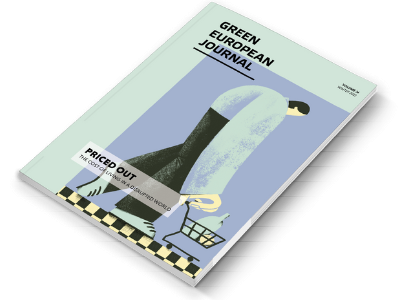Despite the rising cost of living, most of us in the European Union lead privileged lives. Outside the EU’s borders, hundreds of millions of people toil for our prosperity and even fight for our democracy. If you take to the streets to protest against price hikes and job losses, be careful not to throw these people under the bus.
This article is part of a series on the “Inflation Debate”, looking at different understandings about why prices are rising and approaches to what should be done about it. Jonathan Marie, Virginie Monvoisin, and Danae Kyriakopoulou also contributed.
Some 200 million people in the Global South work long hours to produce raw materials, goods, and services for EU households. That is one poorly paid worker for every working person in the EU. It is no wonder that we would need three Earths if all of the inhabitants of our planet were to live like the average EU consumer. Whether through droughts and floods caused by climate change or the deforestation driven by the need to grow feed for our oversized livestock, the ecological impacts of this lifestyle are principally suffered by people in the Global South.
Russia’s invasion of Ukraine and the (justified) sanctions against the aggressor spell more trouble for the Global South. Western countries are grabbing fuel, food, and fertiliser from anywhere but Russia to keep their economies afloat. Meanwhile, developing countries are missing out, and poverty and famine are rising.
Though it will be years before Ukraine can join the European Union, today Ukrainians are paying a high price for defending European values.
Living in the European Union could seem close to idyllic were others not paying the price for our way of life. Our ever-closer union, rule of law, (transnational) democracy, and welfare states may be far from perfect, but they are examples globally. For many outside the EU, they are sources of envy. Europeans can be proud of these achievements. They need to be defended against enemies from within and without, if only because the transition to a non-extractivist economy that respects planetary boundaries must be made democratically and cooperatively. The defence of European democracy today lies in the hands of brave Ukrainians. From Lviv to Mariupol, hundreds of thousands of men and women have left their families and normal lives to fight the invader. They are not only defending their nation against Putin’s delusions of empire, they are also protecting the international rule of law against “might is right” and democratic values against autocracy and kleptocracy. Though it will be years before Ukraine can join the European Union, today Ukrainians are paying a high price for defending European values. The EU is supporting Ukraine with arms, money, and sanctions against Russia. It is quickly weaning itself off Russian energy. Energy prices have surged as a result, driving up inflation and forcing some businesses to close. The higher cost of living and potential job losses may well erode public support for helping Ukraine and sanctioning Russia. However, persistence is key to defeating Putin.
It is therefore crucial for governments to help and compensate the vulnerable while demanding sacrifices from better-off citizens. The proclamation of the “end of abundance” by French president Emmanuel Macron was a fair appraisal of the “polycrisis” that we face, from ecology to geopolitics. Yet unless that message is accompanied by strong redistributive policies, it spells doom for the many Europeans who never enjoyed their share of that abundance. When you have to choose between heating and eating, revolt is understandable.

With governments struggling to respond to growing poverty as energy bills rise and job losses mount, protests are likely to spread (especially as some are unwilling to tax the rich). But however angry we may be with our governments, Europeans still owe their solidarity to the people and places that are toiling and fighting for us.
Take the example of a porcelain factory in central Europe that will have to close if gas prices remain sky-high. Tragically, a hundred people may lose their jobs. You might feel inclined to join the workers’ protest. However, if the European Union were to import enough liquefied natural gas (LNG) to guarantee the survival of all its industries, the lights would go out in poorer countries that depend on imported gas for electricity. The soaring price of LNG due to high European demand has caused power outages in Bangladesh. As harsh as it will sound to the porcelain workers, people can get by without new china more easily than they can without electricity.
Every protest against the cost of living crisis in the EU is followed with great interest in the Kremlin. Putin’s gas weapon is a tool to divide the European Union and weaken its support for Ukraine. What little hope Putin still has of keeping control of occupied Ukrainian territory is likely to be sustained by demonstrations in European cities. Russian television is eager to report on such protests as signs that Europe is begging for Russian gas once more. As you paint your protest banner, ask yourself if the march you want to join will shorten the war or prolong the suffering of the Ukrainian people. And if you do take to the streets to denounce price surges and factory shutdowns, make sure to bring your Ukrainian flag.

